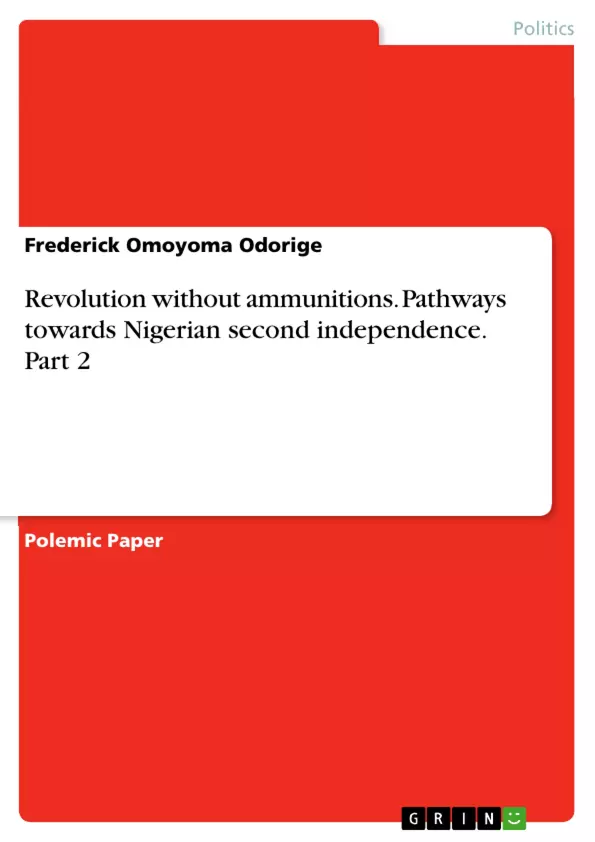This publication is intended to address notable individuals and institutions in Nigeria concerning the insecurity in Nigeria, the weak government response and the hydra-headed corruption promoted by the wasteful bicameral legislative system of the Nigerian National Assembly headed by the President of the Senate.
One of the fulcrum of this publication focuses on the manipulations of democratic principles, bogus salaries appropriated to members of the national assembly against the set laws of the country. It highlights the fact that lawmakers are the real law breakers in Nigeria as they manipulate the law for personal economic gains and political aggrandizement. I have highlighted the discrepancies in governance with the purpose of exposing the loopholes and making recommendations for transparency and good governance.
It is expected, that through this action, my previous publication, "Policing the Gaps between Budgets and Implementation in Developing Economies. The Impediments to Welfare and Security in Ghana and Nigeria", will have a robust leeway towards practical actualization.
Inhaltsverzeichnis (Table of Contents)
- Introduction
- Abstract
- Methodology
- Addressing the revolution
- Two reasons why we are where we are as a people
- TTP: Tactics, Techniques and Procedures
- The Corruption Fight In Nigeria
- Recommendations
Zielsetzung und Themenschwerpunkte (Objectives and Key Themes)
This publication aims to address the pressing issues of insecurity, weak governance response, and systemic corruption plaguing Nigeria, specifically focusing on the manipulative practices of the National Assembly. It seeks to highlight the discrepancies in governance and expose loopholes, ultimately advocating for transparency and good governance.
- The impact of insecurity and corruption on Nigerian society
- The failings of the Nigerian government in addressing these issues
- The role of the National Assembly in perpetuating corruption
- The need for a peaceful revolution to achieve justice and equity
- The potential for international collaboration in promoting democratic reform in Nigeria
Zusammenfassung der Kapitel (Chapter Summaries)
- Introduction: This section provides a comprehensive overview of the security challenges and corruption prevalent in Nigeria, tracing these problems back to the country's history of political instability. It also highlights the shortcomings of past government responses to these issues.
- Abstract: This chapter outlines the publication's main objectives and key themes, focusing on the need to address the lack of accountability and transparency within the Nigerian government. It specifically critiques the wasteful spending and manipulations within the National Assembly.
- Methodology: This chapter details the author's unique approach to public discourse, utilizing a video format and social media platforms to reach a wider audience. The author explains the reasoning behind this method, emphasizing its effectiveness in promoting awareness and galvanizing public participation in political reform.
- Addressing the revolution: This section delves into the author's vision of a peaceful revolution, advocating for a non-violent approach to achieving justice and equity in Nigeria. It underscores the importance of international collaboration and the need for Nigerians to unite for a common goal.
- Two reasons why we are where we are as a people: This chapter examines the root causes of Nigeria's current predicament, focusing on the deep-rooted issues of insecurity, corruption, and a lack of accountability. It provides a critical analysis of the factors contributing to these problems.
- TTP: Tactics, Techniques and Procedures: This chapter details the strategies and methods employed by the author in promoting awareness and engaging with the public. It emphasizes the importance of utilizing social media and public discourse to galvanize support for change.
- The Corruption Fight In Nigeria: This chapter delves into the specific instances of corruption within the Nigerian government, focusing on the role of the National Assembly in manipulating the legal system for personal gain. It exposes the discrepancies in governance and calls for greater transparency and accountability.
Schlüsselwörter (Keywords)
The publication's focus centers on the themes of insecurity, corruption, political reform, and democratic governance in Nigeria. It explores the shortcomings of the Nigerian government's response to these issues, emphasizing the need for a peaceful revolution to achieve justice and equity. Key terms include: security challenges, corruption, National Assembly, democratic principles, accountability, transparency, peaceful revolution, and international collaboration.
Frequently Asked Questions
What are the main causes of insecurity in Nigeria according to the text?
The text points to a history of political instability, weak government response, and systemic corruption within the legislative system.
How does the National Assembly contribute to corruption?
The author highlights manipulative practices, such as appropriating bogus salaries and loophole exploitations for personal economic gain.
What is meant by a "revolution without ammunitions"?
It refers to a peaceful, non-violent revolution aimed at achieving justice, equity, and transparency through public discourse and social media awareness.
What role does social media play in Nigerian political reform?
Social media is used as a tool to promote awareness, reach a wider audience via video formats, and galvanize public participation in governance issues.
Why is international collaboration important for Nigeria?
International collaboration is seen as a way to promote democratic reform and hold the Nigerian government accountable for its failings in security and welfare.
- Arbeit zitieren
- Frederick Omoyoma Odorige (Autor:in), 2018, Revolution without ammunitions. Pathways towards Nigerian second independence. Part 2, München, GRIN Verlag, https://www.grin.com/document/430145



